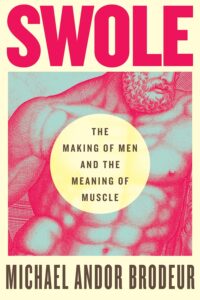In his powerlifting prime, Washington Post classical music critic Michael Andor Brodeur was able to lift 1,200 pounds of iron: the combined weight of his best deadlift, bench, and squat. A couple of hernias later, he says, he’s turned to the more organized, specified lifting techniques characteristic of bodybuilding, designed to achieve bodily symmetry as well as strength. But lifting heavy things and putting them down again remains a central part of his identity.

In his new book, Swole: The Making of Men and the Meaning of Muscle, Brodeur employs the patient, thoughtful language of an arts critic to investigate masculinity. The book isn’t very heavy — at fewer than 300 pages, it’s easy for anyone to pick up. But it’s not so easily put down.
Swole is about growth and change, fantasy and reality. It’s not a vicious takedown of the male ego, nor does it provide a thesis on why men are the way they are.
“I think people come in with an expectation,” says Brodeur. “I’m a gay man writing about masculinity, so of course it’s going to be a David and Goliath thing, where I’m trying to bring down the giant.” But it’s more interesting, he says, to figure out how David and Goliath are the same person. “David wants to be Goliath, and Goliath doesn’t want anyone to know he’s David.”
Brodeur’s basic question is formidable but essential: “Are men okay?” He isn’t sure that they are. “Our culture has convinced men that they’re under attack, that their dominance is at risk.” Brodeur calls it “broken masculinity.” Men are disoriented by the internet, which has made physical appearance irrelevant or unbelievable, or both. They’re scrambling for scraps of power, says Brodeur, categorizing themselves and each other as “alphas” and “betas” and buying into the idea of a “primal” existence in which men are natural and aggressive leaders.
It’s a concept exemplified by American fitness influencer Brian Johnson, better known as the “Liver King,” who is notorious for promoting an “ancestral lifestyle” in which he eats raw meat and exercises constantly. It’s also a concept that Brodeur is critical of.
“There’s a pretty sinister conflation of what seems to be science with what is clearly propaganda,” he says. “We can’t go back to a caveman version of ourselves.” If there’s anything positive about the “primal” craze, he says, “it’s evidence of the wild imagination that men have managed to maintain in the 21st century.”
About 10 years ago, writes Brodeur, he came out as a “meathead.” Like everyone else who lifts obsessively, he’s addicted to iron: “The pump is the high,” he writes. He’s interested in “the pursuit of Big,” a status that is as much a form of amplified costuming — a kind of drag — as it is an identity: “Big Man.”
Long before he began his journey toward bigness, he attended Emerson College in the 1990s and sang vocals and played lead guitar for the Wicked Farleys — “a noise band type of thing,” says Brodeur. “We toured around quite heavily.” After earning his B.F.A. and M.F.A. in creative writing, he began writing book and music reviews for the Weekly Dig in Boston and eventually became its editor. He later moved to editorial and columnist gigs at the Boston Phoenix and the Boston Globe. When the Washington Post announced an opening for a classical music critic in 2020, he applied — and got the job. “I try, in my writing, to lower the drawbridge,” he says. “I’m interested in demystifying things whenever possible.”
For Brodeur, half the work of writing about classical music is acknowledging the depth of history and centuries of scholarship behind the music. “The other half is very subjective and reliant on your own emotional response to things,” he says. “I really like balancing the things about the world that are there for you to learn and know and the things about yourself that you feel and understand.”
The aesthetic realm of music and the physical realm of lifting weights connected when Brodeur, at home in D.C. during the pandemic, stuffed a backpack full of his heaviest books on Verdi and Wagner and started to do weighted squats for exercise. On a more conceptual level, Brodeur describes how the two disparate realms also commune under the idea of “form.”

“Defiance of form is one of the ways we express ourselves,” says Brodeur. For example, a great poem is created when a poet pushes against established forms. Musical composition follows the same pattern. And when athletes transcend the prescribed form of their movements, their physical effort becomes a kind of art. Brodeur experienced such a transformation in the progression of his weightlifting. To lift more, he had to strain; to strain was to defy perfection in form — and accept the risk of disaster. “In physical terms, it could be an injury. In artistic terms, it could be a flop.”
Unsurprisingly, the mythological figure of Hercules features prominently in Brodeur’s book. “We look at him as an icon of strength,” he says, noting how the hero’s name has become synonymous with resolute might: “This Hercules-brand lockbox will never open. This Hercules-brand fence will never fall.” But in nearly every Herculean myth, says Brodeur, Hercules himself was a mess who broke things, flew into fits of rage, and even killed people, including his music teacher and his own children. “His legend is one of perpetual penance, of him constantly making up for his mistakes,” says Brodeur. “He becomes this ambassador of the body being a way to compensate for something else that’s missing.”
In a nod to the 12 trials of Hercules, the book has 12 chapters divided into two parts: one part memoir and one part criticism. “I imagined the parts as the concentric and eccentric halves of an exercise movement, the push and pull,” he says. Reading further, the parts get shorter and shorter. “That’s my attempt to subtly evoke the work of a set of exercises,” says Brodeur.
In the memoir half of the book, Brodeur writes about his mother, who had Alzheimer’s disease. She wasn’t her body, he writes. “None of us are.” He also writes about his father, who as a skinny kid earned the nickname “Bones,” and who then lifted weights to become “big.” He took care of Brodeur’s mother in her last years with an unwavering strength that had nothing to do with muscle. Now, his father is old and burdened by a long list of ailments and illnesses. He bruises easily, his eyes are filled with fluid, and he’s been “chemically castrated” by a drug to treat his cancer. He isn’t his body either, though. Brodeur faces a reckoning of sorts: what makes a man when his form has changed so much?
While Brodeur says the book “smells like blood,” Swole is vulnerable and sincere — and existentially funny in the way the best self-reflective narratives tend to be. “The whole impetus for my writing was asking myself why am I in the gym so much?” says Brodeur. “What am I doing?”
But for all his self-reflection, Brodeur has no “bag of answers” for male readers. He provides the pool to look into but no reflection; like Narcissus, the men kneeling by the water must envision their own. “What would they do with solutions, anyway?” he says. “Men will only do something if they think it was their own idea.”
In the end, Brodeur knows one thing for certain: “There comes a point at which you have to put the weight down,” he says. “Once you start applying the rules of the physical world to the one inside, things start to get a little bit simpler.”



